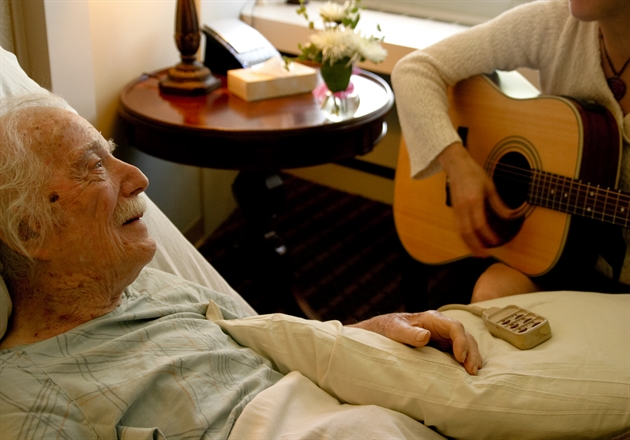The world of theater is often seen as a realm of light-hearted entertainment, but the palliative care musical “Night Side Songs” takes an innovative approach to address profound themes of illness and mortality. Created by Daniel and Patrick Lazour, and with guidance from renowned palliative care specialist Susan Block, this moving production explores the emotional experiences surrounding cancer treatment and end-of-life care. Through the powerful voices of patients, caregivers, and medical professionals, the musical sheds light on the often-silenced conversations about death in today’s healthcare landscape. As audiences engage with the story of a young cancer patient, they are invited to reflect on their own connections to illness, grief, and healing. With its unique blend of music and storytelling, “Night Side Songs” not only entertains but also serves as a vital catalyst for dialogue about the realities of our mortality.
In an era where discussions about terminal illness can be uncomfortable, the illuminating concept of a musical focused on palliative care offers a refreshing perspective. This theatrical approach delves into the complexities of cancer treatment and the emotional ramifications it carries, especially within end-of-life care. Featuring insights from healthcare experts and the personal narratives of those affected, this production invites audiences on a shared journey of understanding and empathy. By framing serious subjects through music and performance, the show breaks down barriers, making the often taboo topic of death more approachable. It sparks vital conversations around the challenges of facing serious illnesses and ultimately encourages a more compassionate understanding of the human experience.
The Significance of Palliative Care in Musical Theater
Palliative care is an essential aspect of the healthcare system, often highlighted in various forms of art, including musical theater. The incorporation of palliative care themes into productions like ‘Night Side Songs’ challenges the traditional notions of how serious topics such as illness and dying are portrayed on stage. Through characters that voice their experiences and emotions, these musicals aim to break the taboo surrounding end-of-life conversations, making them accessible and relatable to the audience.
By revealing the intricacies of the patient-caregiver relationship, musicals can foster empathy and understanding—but they also push the boundaries of societal expectations. The integration of palliative care into theater serves not just as entertainment but also as an educational tool, promoting awareness of emotional suffering related to serious illnesses. This innovative approach allows audiences to experience the realities of dying in a safe space, encouraging personal reflection and discussion.
Emotional Resonance of ‘Night Side Songs’ in Palliative Care
‘Night Side Songs’ stands out as a poignant exploration of the emotional landscape surrounding cancer and end-of-life care. The musical exposes the struggles faced by patients and caregivers through compelling storytelling and heartfelt performances. Susan Block’s influence as a palliative care specialist has ensured that the show accurately reflects the intense emotions encountered in real life, bridging the gap between theatrical expression and healthcare realities.
The rawness of the musical’s narrative allows audiences to confront their feelings about mortality, normalizing conversations about death. This can be particularly significant for individuals who may be grappling with their own experiences or those of loved ones. By embodying the fears, hopes, and struggles of cancer patients, ‘Night Side Songs’ offers a therapeutic perspective on death, reinforcing the importance of discussions surrounding illness in both personal and communal contexts.
How Theater Facilitates Conversations on Dying
The platform of theater has long been a space for discussing difficult topics, and the staging of musicals like ‘Night Side Songs’ can create a unique atmosphere for exploring end-of-life issues. The inclusion of audience participation and intimate settings encourages viewers to engage with the material on a personal level. Such interactions can break down barriers and promote dialogues that might feel uncomfortable in traditional healthcare settings.
The new wave of theater that incorporates themes of palliative care and end-of-life experiences serves to empower individuals and create a sense of community among those affected by illness. It is crucial that audiences leave the theater feeling compelled to continue conversations about dying, as these discussions can provide significant emotional support and understanding for both patients and caregivers.
Susan Block’s Role in Shaping Contemporary Palliative Care
As a pioneer in palliative care, Susan Block’s contributions extend beyond the medical realm into the arts, influencing how the subject of death is perceived and communicated. Her collaboration with the Lazour brothers in developing ‘Night Side Songs’ reflects a growing recognition of the necessity of integrating artistic expression with healthcare practices. This partnership not only elevates the importance of palliative care but also emphasizes the need for innovative methods to approach discussions of mortality.
Block’s insights have led to a more profound understanding of the psychosocial complexities involved in caring for patients at the end of life. Her work encourages healthcare professionals and the wider community to embrace discussions about illness and death candidly, fostering an environment where emotional intelligence and compassion are paramount in care practices. This shift in perspective can ultimately improve patient experiences and support systems during one of life’s most challenging phases.
Interplay Between Music and Healing in Palliative Care
Music has been long acknowledged for its therapeutic benefits, particularly in palliative care. The incorporation of musical elements in productions like ‘Night Side Songs’ serves to enhance emotional connections among those affected by serious illnesses. Melodies and lyrics resonate deeply with audiences, often reflecting the struggles and joys of terminally ill patients, thereby creating an atmosphere conducive to healing and understanding.
The act of singing, both individually and collectively, can evoke cathartic responses and bring people together in shared experiences. This communal act of experiencing music provides comfort, possibly alleviating some loneliness associated with illness. In light of these insights, incorporative musical endeavors within palliative care settings can be transformative, bridging artistic expression and therapeutic healing.
Understanding ‘Night Side Songs’ through Susan Sontag’s Lens
‘Night Side Songs’ draws inspiration from Susan Sontag’s profound insights into illness as a shadowy facet of life. This framing encourages audiences to embrace the uncomfortable truths surrounding serious illnesses, prompting reflections on how societal perceptions of death shape our understanding of life itself. By weaving Sontag’s philosophies into the narrative, the musical becomes a conduit for confronting the often-ignored aspects of mortality.
Through this lens, the Lazour brothers effectively illustrate the coexistence of suffering and meaning, allowing for a multi-dimensional view of illness. Such an approach not only engages the audience but also provokes critical discourse about how we view palliative care within both the medical community and society at large, reinforcing the musical’s role as a tool for enlightenment.
Innovative Theatrical Techniques in ‘Night Side Songs’
The staging of ‘Night Side Songs’ has been strategically designed to foster connection between the actors and the audience, promoting an immersive experience. With performances staged in smaller venues and a focus on theater in the round, the production transcends traditional barriers of performance art, encouraging a more intimate engagement with the narrative and its themes of palliative care and mortality.
Diane Paulus’s vision for breaking the proscenium arch not only enhances audience participation but also reflects the collaborative nature of healthcare discussions. Such innovative techniques challenge viewers to reflect on their own experiences of illness and dying, facilitating deeper conversations about palliative care in a communal and transformative context.
Engaging Audiences with Sing-Along Elements
The inclusion of sing-along elements in ‘Night Side Songs’ serves as a powerful tool to engage audiences actively, further enhancing the emotional impact of the performance. This participatory approach transforms spectators into contributors of the experience, allowing them to express their feelings and thoughts regarding illness and end-of-life care collectively. Such engagement breaks down barriers, fostering a sense of community and shared emotional processing.
By inviting the audience to sing along, the musical creates a supportive environment where individuals can confront their emotions regarding serious illness. This interactive format not only makes the experience more memorable but can also lead to meaningful discussions following the performance, underscoring the role of theater in facilitating conversations on palliative care.
Challenging Societal Norms Surrounding Illness
Musicals like ‘Night Side Songs’ aim to challenge societal norms surrounding illness, death, and the care of terminal patients. By openly discussing these often-taboo subjects, the production encourages audiences to reconsider their own beliefs and biases regarding the end of life. This challenge serves a greater purpose, as it seeks to normalize conversations about dying in both personal and public spheres.
As society increasingly faces the realities of chronic illness and extended end-of-life care, it becomes crucial to engage in dialogues that reflect the complexities of these experiences. The musical’s exploration of these topics invites audiences to confront their assumptions, ultimately promoting a more compassionate understanding of those who navigate the healthcare system at life’s end.
Frequently Asked Questions
What is ‘Night Side Songs’ and how does it relate to palliative care?
‘Night Side Songs’ is a musical that explores the experiences of cancer patients, caregivers, and healthcare professionals, grounded in palliative care principles. Developed with guidance from Susan Block, a leading expert in palliative care, the musical highlights the emotional journeys of individuals navigating end-of-life care.
How does ‘Night Side Songs’ address themes of end-of-life care?
The musical ‘Night Side Songs’ delves into end-of-life care through powerful storytelling, capturing the voices of patients, caregivers, and clinicians. It evokes discussions about death and dying, aiming to destigmatize the conversation around palliative care and enhance empathy and understanding of the dying process.
What insights did Susan Block contribute to ‘Night Side Songs’?
As a palliative care specialist, Susan Block provided crucial insights into the realities of dying and the emotional complexities involved in palliative care. Her feedback helped shape the narrative of ‘Night Side Songs,’ ensuring an authentic representation of the experiences of patients and caregivers in the context of serious illness.
Why should audiences engage with a musical about cancer like ‘Night Side Songs’?
Engaging with a musical about cancer like ‘Night Side Songs’ allows audiences to confront and discuss difficult topics related to illness and mortality. It fosters a shared understanding of the human experience in palliative care, creating a communal space for healing and reflection on end-of-life issues.
What makes ‘Night Side Songs’ a unique theatrical experience in the realm of healthcare?
‘Night Side Songs’ stands out in theater and healthcare as it combines music and narrative to explore serious themes of illness and dying. It is produced in intimate venues that encourage audience participation, creating a unique and impactful space for individuals touched by serious illness to connect with the story and each other.
How does the structure of ‘Night Side Songs’ enhance its message about palliative care?
The structure of ‘Night Side Songs,’ featuring audience engagement and a circular seating arrangement, enhances its message by fostering a sense of community and connection. This interactive format allows the audience to immerse themselves in the themes of palliative care, making the emotional impact of the story more profound.
Can ‘Night Side Songs’ help in destigmatizing conversations about dying and palliative care?
‘Night Side Songs’ aims to destigmatize conversations about dying by presenting the realities of illness in an approachable and artistic manner. By encouraging dialogue through music and storytelling, the musical helps audiences understand the importance of discussing palliative care openly and compassionately.
What role does music play in conveying the themes of palliative care in ‘Night Side Songs’?
Music plays a crucial role in ‘Night Side Songs’ by providing an emotional outlet that conveys the complexities of living with serious illness. The musical score complements the narrative, enhancing the emotional resonance of the themes surrounding palliative care and inviting audiences to engage more deeply with the message.
| Key Point | Details |
|---|---|
| Musical Concept | “Night Side Songs” explores themes of cancer, death, and the emotional experiences of patients and caregivers. |
| Susan Block’s Role | Susan Block advised the Lazour brothers on the musical, ensuring it accurately portrayed palliative care. |
| Inspiration | The musical was inspired by Susan Sontag’s views on illness as the ‘night side of life.’ |
| Audience Engagement | The performance venues are intimate, encouraging audience participation and connection with one another and the actors. |
| Historical Context | Block highlights the evolution of palliative care and the need for honest discussions about dying. |
| Emotional Impact | The musical poignantly reflects on the uncertainty of illness and invites audiences to engage deeply with the material. |
Summary
Palliative care musical “Night Side Songs” presents a profound exploration of life, illness, and its emotional complexities. Through powerful narratives and engaging performances, it encourages audiences to reflect on the realities of serious illness while fostering open discussions about the end of life. As a groundbreaking artistic endeavor, this musical not only entertains but also educates, breaking down barriers surrounding death and dying.



